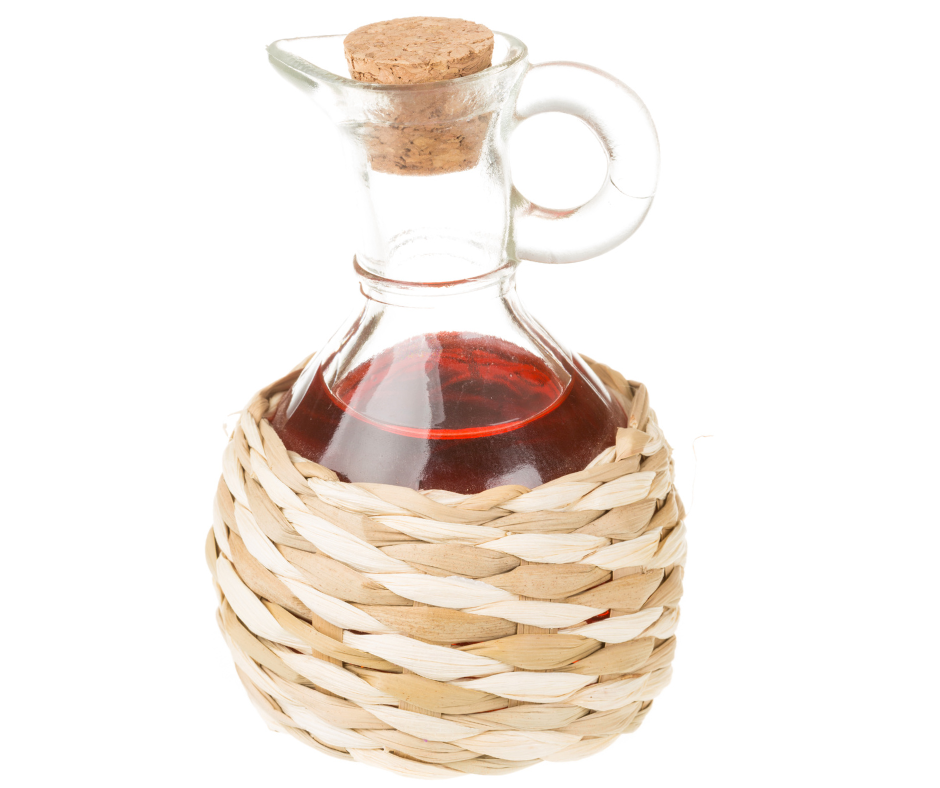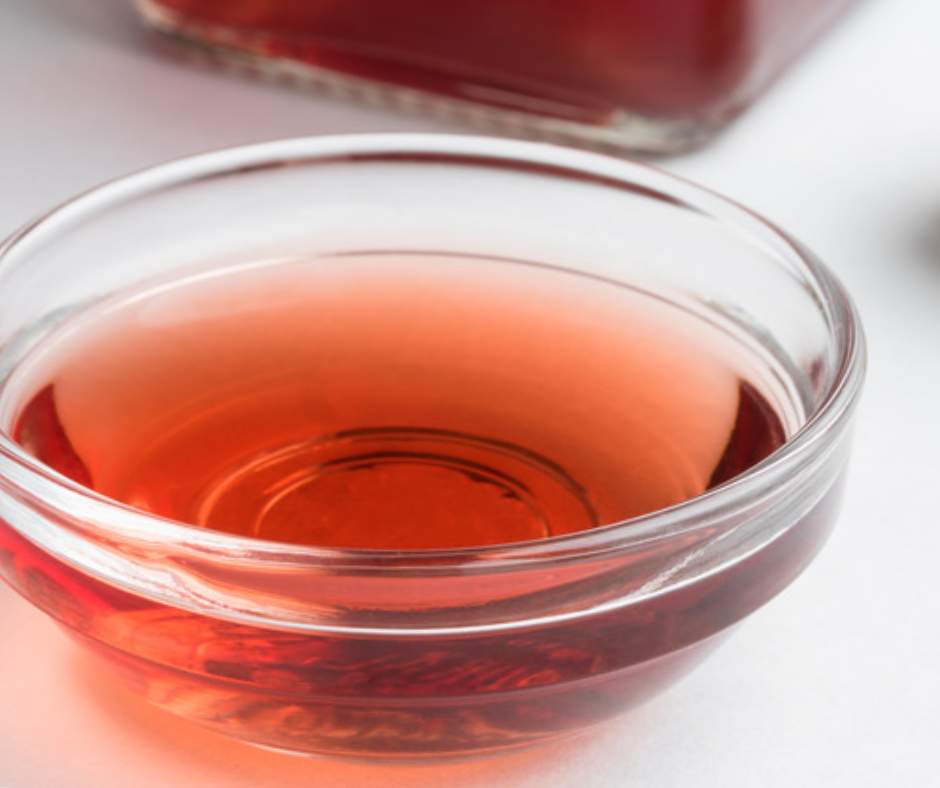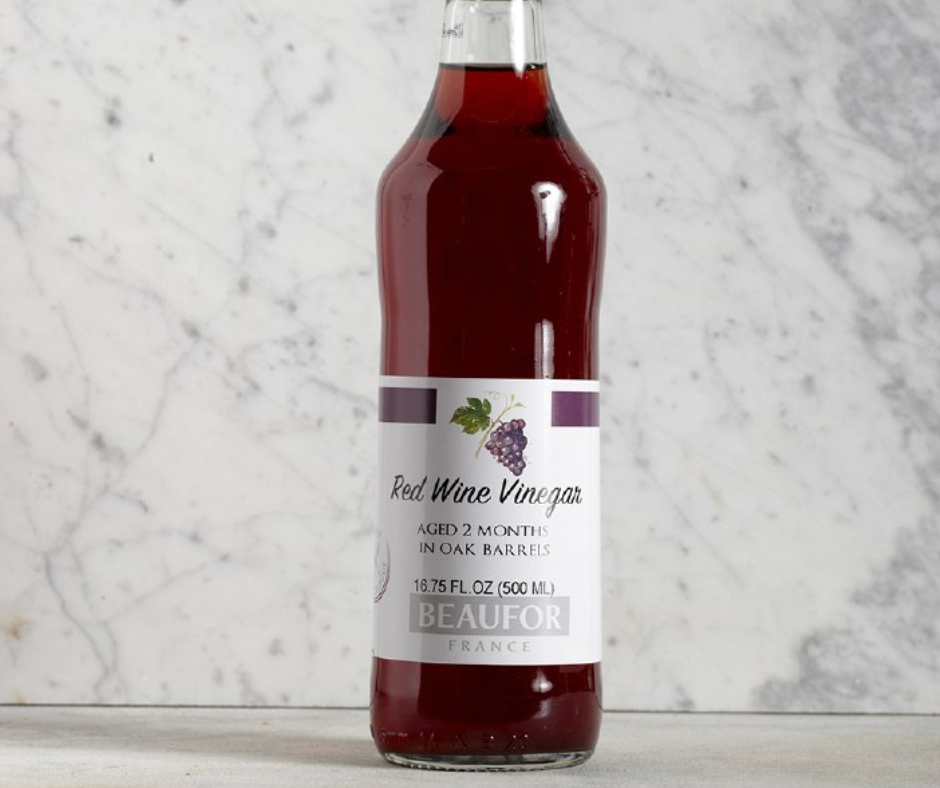Introduction
Red wine vinegar is a versatile and popular ingredient known for its unique flavor and culinary benefits. It is made from red wine and ferments the alcohol into acetic acid, giving it its tangy taste. However, Does Red Wine Vinegar Have Alcohol? Understanding the alcohol content in red wine vinegar can help dispel misconceptions and allow individuals to make informed choices about its consumption.
Unraveling The History And Production Process Of Red Wine Vinegar
Like all wine vinegar, red wine vinegar is made from wine. The production process begins by fermenting red wine with bacteria called Acetobacter. This bacteria converts the alcohol present in the wine into acetic acid through a process known as oxidation. The length of the fermentation process can vary, but it typically takes several weeks to several months to complete.
The history of red wine vinegar dates back centuries and is closely tied to the history of wine itself. It has been used in various cultures for its flavor-enhancing properties and preservation abilities. In ancient times, it was even believed to have medicinal benefits.
Exploring The Uses And Benefits Of Red Wine Vinegar
Red wine vinegar is a versatile ingredient used in various recipes and dishes. It is commonly used in salad dressings, marinades, and sauces to add a tangy and robust flavor. Its acidity also helps to tenderize meats and enhance the flavors of cooked vegetables.
In addition to its culinary uses, red wine vinegar is believed to have some health benefits. It is rich in antioxidants and may have anti-inflammatory properties. Some studies suggest that moderate consumption of red wine vinegar may help regulate blood sugar levels and improve digestion.
Understanding the true alcohol content in red wine vinegar allows individuals to make informed choices about their consumption. While it should not pose any major health risks, those who practice strict abstinence from alcohol or have allergies to alcohol may choose to avoid consuming vinegar as an ingredient or condiment.
In conclusion, red wine vinegar is a popular kitchen staple with a unique flavor and versatility. Understanding its alcohol content can be helpful for various dietary preferences and restrictions. Whether used in dressings, marinades, or sauces, red wine vinegar adds a tangy and robust flavor to dishes and provides potential health benefits.

What Is Red Wine Vinegar?
Red wine vinegar is a tangy and robust ingredient that adds a distinct flavor to various culinary dishes. It is made from red wine that undergoes a fermentation process, converting the alcohol into acetic acid. This transformation gives red wine vinegar its characteristic tang and acidity. Understanding red wine vinegar’s key components and characteristics can provide insights into its alcohol content and how it can be utilized in cooking and dressing.
Understanding The Key Components And Characteristics Of Red Wine Vinegar
Red wine vinegar is composed of various components that contribute to its unique flavor profile. One of the main components is acetic acid, which is formed during the fermentation process. Acetic acid gives red wine vinegar its sharp and tangy taste, making it a popular choice for vinaigrettes and marinades.
In addition to acetic acid, red wine vinegar contains phenolic compounds and other organic acids. These compounds contribute to the complexity of its flavor and can vary depending on the type of red wine used in the production process. The specific combination of these components gives each red wine vinegar its distinct characteristics.
Examining The Different Types And Variations Of Red Wine Vinegar
Red wine vinegar comes in different types and variations, each with its unique flavor profile. The type of red wine used and the fermentation process can influence the taste, acidity, and alcohol content of the vinegar.
For example, aged red wine vinegar is made from red wine aged in wooden barrels, allowing it to develop a more mellow and complex flavor. This type of vinegar tends to have a lower alcohol content due to the extended fermentation process.
On the other hand, commercial red wine vinegar is typically made from younger wines and has a shorter fermentation period, resulting in a higher alcohol content. However, it is important to note that the alcohol content in red wine vinegar is usually minimal, as the fermentation process converts most of the alcohol into acetic acid.
In conclusion, red wine vinegar is a versatile ingredient with a tangy and robust flavor. Understanding its key components and the variations available can help you choose the right type of red wine vinegar for specific culinary purposes.
Does Red Wine Vinegar Have Alcohol?
Unveiling The Process Of Converting Alcohol Into Acetic Acid
When it comes to understanding the alcohol content in red wine vinegar, it is essential to explore the process of how red wine vinegar is made. Like all wine vinegar, red wine vinegar is derived from wine. During the fermentation process, the alcohol present in the wine is converted into acetic acid by the action of bacteria called Acetobacter. This transformation gives red wine vinegar its distinct tangy taste.
The process begins by adding a culture of Acetobacter to the red wine. The Acetobacter consumes the alcohol in the wine and converts it into acetic acid through oxidation. Over time, the alcohol content progressively decreases as more acetic acid is produced. This process occurs under specific conditions, including temperature, oxygen exposure, and the presence of a mother culture, which consists of bacteria that facilitate the fermentation process.
Analyzing The Residual Alcohol Content In Red Wine Vinegar
The alcohol content in red wine vinegar is significantly reduced compared to the original wine. According to the U.S. Food and Drug Administration, the alcohol content in red wine vinegar is typically less than 0.5% alcohol by volume. This minimal alcohol content results from fermentation that converts most alcohol into acetic acid.
It is important to note that the residual alcohol content in red wine vinegar is generally considered safe and does not pose a risk of intoxication. The small amount of alcohol remaining is unlikely to have any noticeable effect, even when used in culinary preparations.
Therefore, understanding the facts about the alcohol content in red wine vinegar can help dispel misconceptions and allow consumers to enjoy its culinary benefits confidently. Whether used as a dressing, marinade, or flavor enhancer in cooking, red wine vinegar adds a tangy and robust flavor without contributing significant alcohol content to the dish.
In summary, the answer to ‘Does Red Wine Vinegar Have Alcohol?’ is yes. Red wine vinegar has a minimal alcohol content of less than 0.5%. The conversion of alcohol into acetic acid during fermentation ensures that red wine vinegar can be safely enjoyed in culinary applications without intoxication.
Factors Affecting Alcohol Content
Identifying The Factors That Influence The Alcohol Content In Red Wine Vinegar
To fully understand the alcohol content in red wine vinegar, examining the factors that can influence it is crucial. Several key factors can impact the alcohol levels in red wine vinegar, including the type and quality of the wine used for fermentation, the fermentation process, and the aging period.
The type and quality of the wine used for fermentation play a significant role in determining the initial alcohol content in red wine vinegar. Different grape varieties have varying sugar contents, which directly affects the alcohol levels produced during the fermentation process. For example, wines made from grapes with higher sugar content will likely result in red wine vinegar with a higher alcohol content.
Furthermore, the fermentation process itself is a critical factor. The presence of particular bacteria, such as Acetobacter, is essential for converting the alcohol in the wine into acetic acid. The duration and conditions of the fermentation process also influence the alcohol conversion rate. Longer fermentation periods typically result in higher acetic acid production and lower alcohol content in the resulting vinegar.
Additionally, the aging period of red wine vinegar plays a role in decreasing its alcohol content. Over time, with proper storage and aging, the acetic acid concentration continues to increase while the alcohol levels continue to decrease. This aging process helps further to enhance the flavors and overall quality of the vinegar.
Understanding these factors is crucial for individuals who want to make informed choices about their consumption of red wine vinegar. It allows them to select vinegars that align with their preferences and dietary needs. While the residual alcohol content in red wine vinegar is typically less than 0.5%, individuals who follow strict alcohol abstinence or have alcohol allergies may choose to avoid consuming vinegar altogether.
In conclusion, several factors can influence the alcohol content in red wine vinegar, including the type and quality of the wine used, the fermentation process, and the aging period. A deeper understanding of these factors allows individuals to make educated decisions about incorporating red wine vinegar into their diets, considering its culinary benefits and alcohol content.

Health And Nutritional Aspects
Discovering The Health Benefits Of Consuming Red Wine Vinegar
Red wine vinegar offers more than a flavorful addition to your favorite recipes. It also provides various health benefits, making it a valuable addition to a balanced diet. Here are a few reasons to consider incorporating red wine vinegar into your culinary repertoire:
- May aid weight loss: Red wine vinegar has been shown to help with weight loss due to its acetic acid content, which may help reduce body weight, waist circumference, and fat storage. Including red wine vinegar in your dishes can be a healthy and low-calorie way to add flavor.
- Contains powerful antioxidants: Red wine vinegar contains antioxidants such as resveratrol, a compound found in red grapes. These antioxidants help protect the body against damage from harmful free radicals, potentially reducing the risk of chronic diseases like heart disease and certain types of cancer.
- May boost heart health: The acetic acid in red wine vinegar may benefit heart health by reducing cholesterol levels and lowering blood pressure. Including red wine vinegar in your diet may support healthy cardiovascular function.
Examining The Nutritional Value And Calorie Content
Regarding nutritional value, red wine vinegar is low in calories and carbohydrates. It contains negligible amounts of fat and protein. The primary component of red wine vinegar is acetic acid, which provides the characteristic tartness and distinctive flavor.
The calorie content of red wine vinegar is approximately 3-5 calories per tablespoon, making it a guilt-free addition to your meals. It is important to note that the alcohol content in red wine vinegar is typically less than 0.5%, which is considered negligible and should not pose any major health risks.
When incorporating red wine vinegar into your diet, it is crucial to consider portion sizes and moderation. While it offers health benefits, excessive vinegar consumption, like any other food or ingredient, may lead to unwanted side effects.
In conclusion, red wine vinegar adds a unique flavor to culinary creations and provides various health benefits. It may aid in weight loss, contains powerful antioxidants, and has potential cardio-protective properties. With its low calorie and carbohydrate content, red wine vinegar can be a great addition to a healthy diet. Understanding its nutritional value and alcohol content allows individuals to make informed choices and confidently enjoy red wine vinegar’s culinary benefits.
Unraveling Red Wine Vinegar: Alcohol Content Insights
Many people wonder about the alcohol content in red wine vinegar and its potential effects. It is important to dispel any misconceptions and clarify this topic to help consumers enjoy the culinary benefits of red wine vinegar confidently.
Red wine vinegar is made from wine, like all other wine vinegar. However, during fermentation, the alcohol content in wine is converted into acetic acid by bacteria. As a result, the alcohol content in red wine vinegar is typically less than 0.5%, which is considered negligible. This means that consuming red wine vinegar in your meals should not pose any major health risks related to alcohol consumption.
Understanding the facts about the alcohol content in red wine vinegar allows individuals to make informed choices. They can confidently incorporate it into their cooking, dressings, and marinades, knowing the alcohol content is minimal.
Red wine vinegar is highly versatile in cooking and recipes. Its unique flavor and acidity make it a sought-after ingredient by chefs and home cooks. It can enhance the flavor of various dishes, adding a tangy and acidic note that balances the richness of meats, sauces, and dressings. Its versatility extends to salad dressings, marinades, pickling solutions, and desserts.
When incorporating red wine vinegar into everyday meals, remember a few tips. Firstly, start with a small amount and gradually increase based on your taste preferences. Red wine vinegar is quite potent, and a little goes a long way. Secondly, combine it with complementary flavors such as olive oil, herbs, garlic, or honey to create a well-rounded and balanced taste. Lastly, be mindful of the acidity level and adjust it by adding a pinch of sugar or a splash of water if necessary.
Overall, understanding the alcohol content in red wine vinegar is essential for enjoying its culinary benefits. With its unique flavor and versatility, red wine vinegar can be confidently used in cooking, dressings, and marinades. Unraveling the facts about red wine vinegar’s alcohol content allows individuals to appreciate its flavors and health benefits without concerns about alcohol consumption.
Pairings: Enhancing Flavors
Exploring The Best Food Pairings With Red Wine Vinegar
Red wine vinegar offers a delightful complexity that can elevate many dishes. Understanding the nuances of flavor profiles and pairings is essential for utilizing red wine vinegar to its full potential. Its ability to enhance and complement various ingredients makes it indispensable in the gastronomic world, inspiring chefs to explore new culinary horizons and create unforgettable dining experiences.
When pairing red wine vinegar with food, numerous opportunities exist to enhance flavors and create dynamic culinary combinations. One popular pairing is with salads. A simple vinaigrette made with red wine vinegar, olive oil, herbs, and a touch of honey can bring out the freshness and vibrancy of a salad, adding a tangy and acidic note that balances the leafy greens and other ingredients.
Another exciting pairing is with roasted vegetables. The acidity of red wine vinegar can cut through the richness of roasted vegetables, enhancing their natural flavors and adding a delicious tang. Drizzle red wine vinegar over roasted Brussels sprouts, carrots, or cauliflower to elevate the taste and create a delightful contrast.
When it comes to proteins, red wine vinegar can work wonders. Marinating meats in red wine vinegar, garlic, and herbs can help tenderize the meat while infusing it with a delicious depth of flavor. Red wine vinegar can also deglaze pans and create succulent pan sauces to accompany chicken, beef, or pork.
Red wine vinegar can also be incorporated into desserts for those with a sweet tooth. Its tartness can balance the sweetness, adding a unique twist to dishes like fruit compotes, poached pears, or even chocolate sauces.
Understanding the best food pairings with red wine vinegar allows you to create harmonious and well-balanced dishes. Experiment with different combinations and let your taste buds guide you on an exciting culinary journey. Whether it’s enhancing the flavors of salads, roasted vegetables, meats, or even desserts, red wine vinegar offers endless possibilities for creating memorable dining experiences.

Understanding The Proper Storage Techniques And Conditions For Red Wine Vinegar
Proper storage is crucial to maintaining red wine vinegar’s quality and flavor. By understanding the right techniques and conditions, you can ensure that your bottle of red wine vinegar stays fresh and flavorful for a long time.
One of the most important aspects of proper storage is controlling the temperature. Red wine vinegar should be stored in a cool and dark place, away from direct sunlight and heat sources. Ideally, a pantry or cupboard that maintains a stable temperature is perfect for preserving the vinegar’s quality. Avoid storing red wine vinegar near stoves, ovens, or any area that experiences temperature fluctuations.
It is also important to minimize exposure to light and oxygen. Light can degrade the vinegar and alter its flavor, so keeping it in a dark bottle or wrapping it in a dark-colored cloth can prevent light from affecting its quality. Additionally, oxygen exposure can lead to oxidation, resulting in a loss of flavor. Make sure to seal the bottle or container to minimize oxygen exposure tightly.
Choosing the right container is another important aspect of proper storage. Red wine vinegar should be stored in a glass or non-reactive container to maintain flavor and prevent unwanted reactions with other materials. Avoid storing red wine vinegar in metal or plastic containers, as these can affect the taste and quality of the vinegar.
Discussing The Shelf Life And Signs Of Spoilage
The shelf life of red wine vinegar is quite long and can extend for years if stored properly. However, it is important to be aware of signs of spoilage to ensure you use vinegar that is still safe to consume.
While red wine vinegar does not necessarily spoil, it can lose its flavor and quality over time. If the vinegar appears cloudy, has a strong, unpleasant odor, or has developed mold, it is best to discard it. These signs indicate that the vinegar has gone bad and should not be used in cooking or consuming.
It is also important to note that the “best by” or expiration date on the bottle is a conservative estimate. If stored properly, red wine vinegar can retain its flavor and quality for months or even years past the recommended date. However, if you notice any spoilage, it is always better to err on the side of caution and discard the vinegar.
By following the proper storage techniques and being mindful of signs of spoilage, you can ensure that your red wine vinegar stays fresh and flavorful, allowing you to enjoy its delightful complexity in various culinary creations.
Conclusion
Summarizing The Key Insights About Red Wine Vinegar’s Alcohol Content
Now you should know the answer to ‘Does Red Wine Vinegar Have Alcohol?’. After debunking the myths surrounding the alcohol content in red wine vinegar, it is clear that it contains a small amount of alcohol. However, the alcohol content is relatively low, making it safe for consumption by individuals of all ages. Understanding the true alcohol content in red wine vinegar allows individuals to make informed choices about their consumption based on their personal preferences and health considerations.
It is important to note that while red wine vinegar contains alcohol, it should not pose any major health risks. However, individuals who practice strict abstinence from alcohol or have allergies to alcohol may choose to avoid consuming vinegar as an ingredient or condiment.
Final Thoughts And Recommendations For Choosing And Using Red Wine Vinegar.
When choosing and using red wine vinegar, it is essential to consider its quality and storage conditions. Proper storage techniques, such as keeping the vinegar in a cool and dark place away from direct sunlight and heat sources, are crucial to maintaining its flavor and quality.
Regarding usage, red wine vinegar can be versatile in various culinary creations. Its tangy and slightly acidic flavor can enhance salad dressings, marinades, sauces, and desserts. Experimenting with different recipes and incorporating red wine vinegar can add depth and complexity to your dishes.
When purchasing red wine vinegar, opt for reputable brands or artisanal varieties known for their quality. Consider reading labels and choosing vinegar made from high-quality grapes that have been naturally fermented.
In conclusion, red wine vinegar is a flavorful and versatile ingredient that adds a unique touch to dishes. While it does contain a small amount of alcohol, it is considered safe for consumption. By understanding its alcohol content, proper storage techniques, and selecting high-quality options, individuals can confidently enjoy the delightful complexity of red wine vinegar in their culinary endeavors.
FAQ: Does Red Wine Vinegar Have Alcohol? Unraveling Red Wine Vinegar’s Alcohol Content
Q: Does Red Wine Vinegar Have Alcohol?
A: There is alcohol in red wine vinegar, but the content is very small. Typically, the alcohol by volume (ABV) in red wine vinegar is less than 0.5%.
Q: How is red wine vinegar made?
A: Red wine vinegar is made through a process called fermentation. During fermentation, yeast converts the natural sugars in grapes into alcohol and carbon dioxide. The alcohol then undergoes further fermentation to transform into acetic acid, which gives vinegar its distinct tangy flavor.
Q: What factors can affect the alcohol content in red wine vinegar?
A: Several factors can influence the alcohol content in red wine vinegar, including the grape variety used, winemaking techniques, and aging processes. However, on average, red wine vinegar has a significantly lower alcohol content than red wine.
Q: What is the average alcohol content in red wine?
A: The average alcohol by volume (ABV) in red wine ranges from 12% to 15%. This can vary depending on the grape variety, winemaking methods, and other factors.
Q: Why is the alcohol content lower in red wine vinegar than in red wine?
A: The alcohol content in red wine vinegar is lower because the alcohol undergoes a secondary fermentation process to transform into acetic acid. This process reduces the alcohol content significantly.
Q: Are there any regulations regarding the alcohol content in commercially sold vinegar?
A: The U.S. Food and Drug Administration requires commercially sold vinegar to have less than 0.5% alcohol by volume. This regulation ensures that the alcohol content in vinegar remains very low.
Q: Can red wine vinegar be consumed by individuals sensitive to alcohol?
A: As the alcohol content in red wine vinegar is minimal, it is generally safe for individuals who are sensitive to alcohol or those avoiding alcohol for personal or health reasons. However, it’s always advisable to consult with a healthcare professional if you have specific concerns or dietary restrictions.
Q: What are the common uses of red wine vinegar?
A: Red wine vinegar is a versatile ingredient in various culinary applications. It is commonly used in salad dressings, marinades, and sauces and as a flavor enhancer in cooking. Its tangy and robust flavor adds depth to dishes and balances flavors.
Q: Can red wine vinegar be substituted with other types of vinegar?
A: While red wine vinegar has a unique flavor profile, you can substitute it with other kinds of vinegar like white wine vinegar, apple cider vinegar, or balsamic vinegar, depending on the recipe. Keep in mind that the substitution may alter the taste slightly.
Q: How should red wine vinegar be stored?
A: Red wine vinegar should be stored in a cool, dark place, away from direct sunlight or heat sources. Seal the bottle tightly to prevent air from entering, as exposure to air can degrade the quality and flavor over time. Proper storage ensures the longevity and freshness of the vinegar.

Andre Lotz immigrated to the United States from South Africa almost 20 years ago. Still, he didn’t feel truly at home until he settled in Mobile—a city that reminds him of his childhood home of Fish Hoek on the southern cape of Africa.

